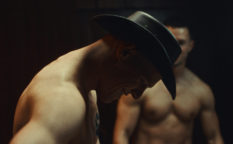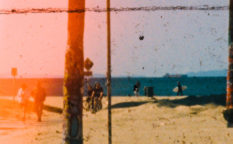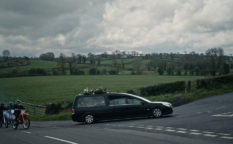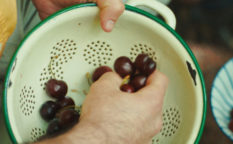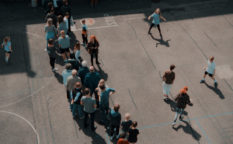Ronit Kertsner: When I saw the suffering of the refugees, I had to do something
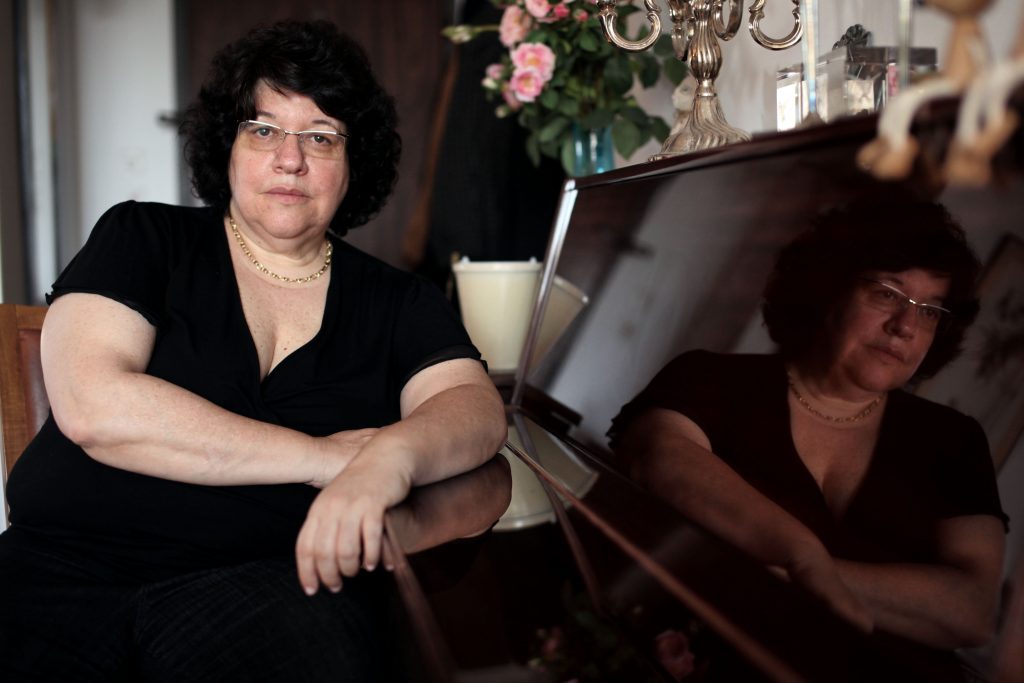
Ronit Kertsner’s 6th feature-length documentary Refugee Lullaby which world-premiered in Graz at the Diagonale, is an intimate portrait or Hans Breuer who became famous as “the Austrian sheperd who drives refugees across borer to safety” (Patrick Kingsley for The Guardian) and his attempts to help as many people as possible on their hellish way to a better life in Europe. The shooting started in 2015 amidst the biggest refugee crisis and it ended some two years later, in times of cynical political changes that also affected the lives of people who believed that the worst is behind them.
Ubiquarian met up with the Israeli director to chat about her unusual lead and the network of good-doers that he was a part of, but also about the parallels they both draw between the spite that refugees from moslem countries are facing nowadays and the way Jewish people were treated not so long ago.
Just like your previous films, “Refugee Lullaby” is pretty much about identity.
Basically, my personal search started when I was born because I was separated from my mother at birth. I missed on the experience of touching her, smelling her, seeing her, so one could say that I have no connections to any roots whatsoever. Since I can remember, this was something that was bothering me. I wanted to know who I am, and where I’m from.
This is the basic question that I’ve been trying to answer all my life. It is interesting that I started directing films only after I found my birthmother. I started searching for her after my adoptive parents were gone, so to speak. My father had died, and my mother was diagnosed with Alzheimer and it felt as if she wasn’t there. It’s only then that I felt genuinely free. It’s strange that I waited that long. I was interested in film since high-school. I began learning about films when I was 14 years old, and during summers I worked at the Israeli TV synchronising things. Although I studied to become a director, something about not having an Identity stopped me from fulfilling that dream. The moment that pressure was lifted, I started following my path. Working on a film consumes your whole energy and your whole life, finding a subject that you devote yourself to has to be something that really speaks to you. Whenever I hear any story dealing with identity difficulties, my radar activates. At the same time, I am still searching for answers. That’s why I am interested in stories related to the question of identity and I always find strong connection with people that I am working with, with all of my protagonists. We become soulmates.
You discovered Hans by chance, on internet.
A friend of mine sent me a link to his video by e-mail and I felt that I had to find this guy. It was clear to me that he’s a very special person and that there is a story there. I started looking him up. I found his youtube account, than I found him on facebook where I contacted him. We began having long video conversations until early morning hours. One day, he said – enough of this talking, come, let’s meet up and make a film. On that day it just happened that I was working with a fantastic cinematographer Shalom Rufeisen who did an unbelievable job on the film. In a way everything fell into its right place. Months earlier I bought a whole set of technical equipment in case anything came up, which turned out to be really good. I had everything ready to go, I just needed a reason to do it. A couple of days befor Hans invited me to come to Vienna, I spoke to Shalom who said he was ready for an adventure. His children had left were grown up and left home, he once again was ready for a spontaneous adventure. I grabbed the opportunity after speaking to Hans and ask him if he felt like an adventure already on Monday? And that’s how it started.
Although they were not that close due to complicated family relations, Hans and his niece Verena found themselves working for the same cause. Do you believe that there is some kind of inherited goodness?
That’s always a question of nature and nurture, but here it’s a mixture. When you grow up in a family that was involved in good deeds, this is what you learn at home. You don’t only have it in you, but you learn it as well, Hans’s mother’s family were all part of the communist resistance against the Nazis, his father was a refugee himself during WW2, this is the home Hans grew up in. As an adopted child, the question is – how much of the genetics you can be aware of? How much have you inherited? And what part dose the home you grow up in have in making who you are?
During the making of the documentary, you lived in the house of Hans’s niece where you had the opportunity to see from close how the refugee help network functioned. How many people were involved?
It was a huge network. Hans and Verena were just two tiny screws in a big machine. It was ordinary people who organized themselves without the outside help by big organizations. They were good people who decided to do something, and they were connected through the social media. There were websites of helpers living in different places, all active on facebook and talking about what needs to be done, people interested in helping could see what was needed where and when. You probably recall the woman who was putting excel sheets with train schedules and numbers of refugee passengers that were on those trains. It was activists like that.
In the conversation with the audience after the screening, you said that you got curious about this story because when the Jews were persecuted, nobody came to help them.
At the time it was impossible not to compare the two, because visually it was something very similar. Huge groups of people were marching night and day, surrounded by police, hungry, thirsty and tired. The difference was that they were trying to save themselves; they were marching towards a better life, which was exactly the opposite from the Jews those 80 years ago. Who were marching to death. To illustrate it little better, I have to quote Verena who told me that when she went to one of the camps, she saw a huge stack of shoes. For her, the stack of shoes meant only one thing before. But the shoes in refugee camps stood for something else – people took off their worn shoes from their feet and put on new clean worm ones, to continue their path to a better life. For her, all of a sudden, there were now two stacks of shoes.
I was born in 1956, only eleven years after the war, and the memories of WWII are very deep in the psyche of any Jew who has connections to Europe. The worst thing is that Jews are still very angry, at the response of people in Europe. They expected horrible things from Nazi Germans, but not from their neighbours and friends. Instead of help, in many cases something else happened. So, the wounds of betrayal are deep. In the wake of latest events, maybe something has changed, and people in Europe began waking up to the suffering of “the others”.
We are witnessing the uprise of the right-wing movements, and in the meanwhile many European countries have clearly racist politicians in their governments.
It has made a full circle. After the Nazi Germany everybody was horrified about what happened. If you were a racist you couldn’t even talk about it. And now, with what is happening in the world, you are allowed to say awful things because there are right-wing governments everywhere encouraging racism. We also have our own problems with racism in Israel. So, I think the things are making another round. As Hans said at one point – Today’s Muslims are the new Jews. It seems like everybody has a reason to hate them. They are called names – terrorists, backward, dangerous, rapists, they want to take over Europe and then the rest of the world. Earlier, the same wording was used to describe the Jews. And that’s not so long ago.
When I saw the suffering of the refugees, I had to do something. I didn’t know how to help from Israel, Hans suggested I make a film that will touch peoples harts, “this is what you are good at”, he said.
What was for you the most heart-breaking moment during filming?
It was in the refugee camp when a few days old baby couldn’t stop screaming. The mother didn’t know what to do, or maybe she was just too exhausted. Hans went to the infant, lift him and started singing. It’s the small things that one should do. It’s about kindness, caring, and understanding, and not just giving money. Hans has 5 children and 8 grand-children; he knows how to calm down a baby. He also knows how to improvise, leading the life he does. Whenever he came to a camp, we would first check what was most needed, like when he helped to organize hot tea at one of the refugees gathering points. He had good practical ideas how to make it happen. Imagine all those people in the freezing cold. You can’t see it in the film, but it was very cold, minus something. To arrive and have a warm cup of tea waiting for you, that means something. Such acts of kindness can change the world. I am sure that those refugees will remember the acts of kindness that they received, and one day they will help others in need. Saying that there are terrorists among them is such nonsense. If an isis terrorist wants to enter Germany, he would definitely have enough money to get himself a fake passport, fly over to Europe and got to any city he wants. It’s the same mechanism as anti-Semitism. Making people frightened of “the other”. I know it from my life in Israel. We also had busses blown up, but how many people did this? The majority of people want to have a good, quiet life. The terrorists’ goal is to create fear at the expense of ordinary people. This is political. I believe that most Arab people want a quiet life. That’s what was great about this time – no governments or politicians, but ordinary people joined together to help refugees. And the most important thing – they got the job done.
Have you met any volunteers abroad – in Serbia and Hungary?
Oh, yes. We met plenty of them and they came from all over the world by the way. There were also some big organisations involved, also in Serbia which you can see in the film when a long queue of people forms waiting for food. But there were also lots of private donations. That was something that wasn’t in the media, at the time. I was trying to get the money ,to fund the film to show that side. And then, there was the bombing in Paris and all of the sudden, nobody wanted to touch anything with refugees anymore. We couldn’t get the money form anyone. And I must say, the first to put the money in this film were Austrians – the film institute. In Israel I was refused by all broadcasters. They told me the topic wasn’t interesting, among other things. It took a long time to get a foot there. Finaly Fortunately, the situation has changed to the better. A co-production between Israel and Austria is not easy at all. It’s two different planets in terms how things are done.
The film was very well received both in Israel, and in Austria. This of course makes me very happy, knowing that the film succeeded in touching people’s hearts, like Hans had wanted.

